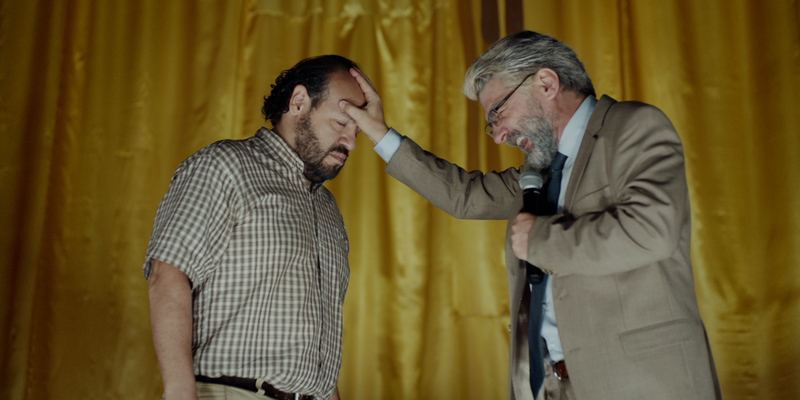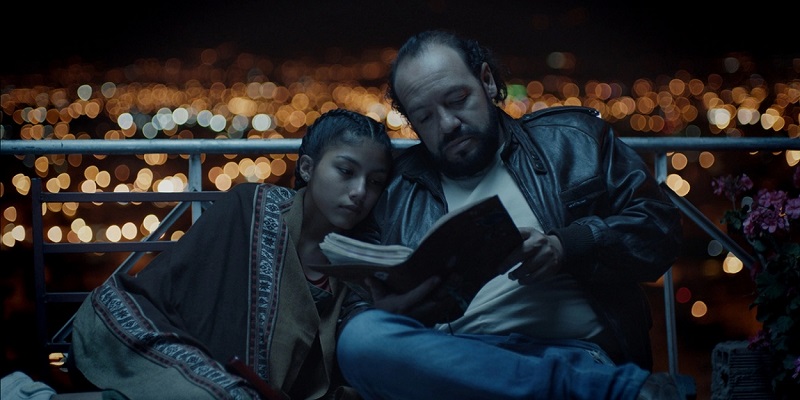
Review by
Eric Hillis
Directed by: Martin Boulocq
Starring: César Troncoso, Mirella Pascual, Svet Ailyn Mena, Romel Vargas, Teresa
Gutiérrez

Like the recent Brazilian dramas
Divine Love
and
Raquel 1:1, Bolivian filmmaker Martín Boulocq's
The Visitor is another sideways glance at the growing
influence of the evangelical church in South America. Where the
aforementioned Brazilian films critiqued the church's misogyny,
The Visitor exposes the hypocrisy of a church that
preaches goodwill while refusing to extend its warmth to those
attempting to make up for past sins.

After serving a three year prison sentence for an ambiguous crime
seemingly spawned by his alcoholism, Humberto (Enrique Aráoz)
returns to his hometown hoping to reestablish a relationship with his
teenage daughter Aleida (Svet Mena). The girl now lives with her
maternal grandparents, Carlos (César Troncoso) and Elizabeth (Mirella Pascual), the pastors of a local evangelical mega-church that seems to have
most of the town in thrall to its charismatic leaders.
Realising he can't possibly win a custody battle, Humberto is forced to
submit himself to the whims of Carlos and Elizabeth, who cruelly use him
as an example to their congregation while exploiting his beautiful voice
as he performs arias for a pittance at wakes. Humberto is equally
exploitative however, enlisting teenage members of the congregation to
sell phone cards around town under the pretence that the profits are
going to the church.

Though its protagonist is a wannabe opera singer, there's little
operatic about The Visitor. Boulocq films at a quiet remove, his camera a silent, unobtrusive
observer that rarely gets into the faces of the film's characters. The
silence of the penant Humberto is contrasted with the bombastic,
flamboyant nature of Carlos, for whom everything is a show. The name
Humberto is said to evoke an intelligent man of giant proportions, a
bill this film's protagonist fits. He remains stooped over throughout,
like a gentle giant worried his frame might take the roof of a house if
he rises to his full height. He's a humble man, the exact opposite of
the flash Carlos, and despite the latter's disapproval, it's Humberto
who comes off as the protagonist of some moral fable from the good
book.
When Boulocq does move his camera in for a close-up, it's to staggering
effect. As he's humiliated and spiritually emasculated on stage by
Carlos, we see a rage growing behind Humberto's eyes, steam almost
coming from his bull-like nostrils. He's clearly a man whose temper has
gotten the better of him in the past, which makes us wonder just how bad
his past sins were.

The ambiguity of Boulocq's storytelling and the refusal to divulge the
nature of his protagonist's past crime may prove frustrating for some
viewers. But regardless of what Humberto has done, the point is that he
isn't being treated in what is considered a Christian manner by those
who preach such virtues. Does he deserve custody of his daughter?
Perhaps not, as he certainly can't provide her with the material
lifestyle her grandparents' wealth has bestowed upon her. But while
Carlos exerts a religious influence over Aleida, we're left in little
doubt that Humberto is her true spiritual mentor.


